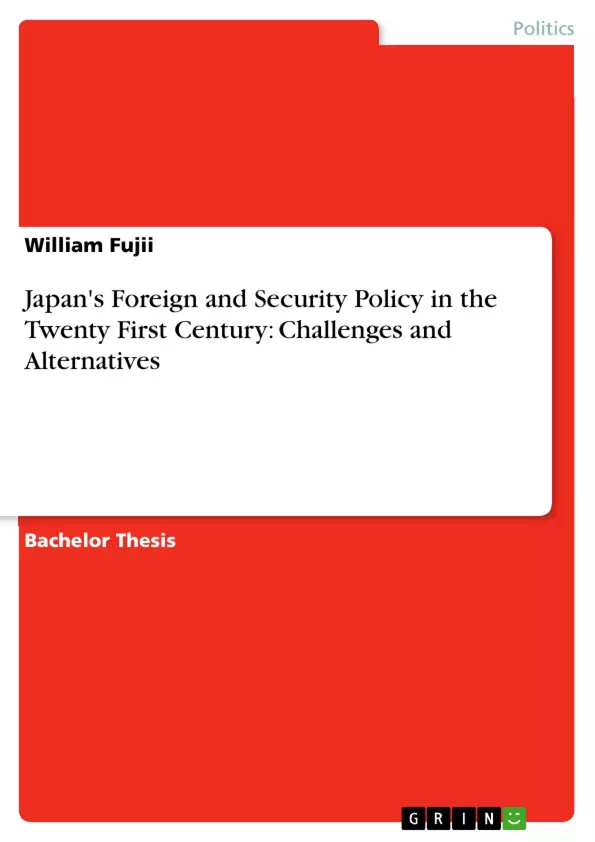This paper argues that because of the new reality of the twenty-first century where the United States is beginning to decline, China is rising and North Korea has acquired nuclear capabilities, Japan may need to rethink its foreign and security policy which are deeply anchored on its alliance with Washington. In the light of these new challenges, this paper considers potential problems and constrains in Tokyo’s current strategy and suggests it may not be in Japan’s best interest to continue pursuing them. Finally, alternatives to Japan’s security policy are considered and this paper concludes that no single alternative could replace the U.S.-Japan alliance as an effective security policy in the foreseeable future. Rather, all the alternatives pursued together would potentially lead to an efficacious option, consequently providing Japan’s foreign policy with greater independence from the United States.
Inhaltsverzeichnis (Table of Contents)
- Introduction
- Japan's foreign and security policy trajectory since 1945
- The Pacifist Constitution and the Yoshida Doctrine
- The onset of the Cold War and entry onto the U.S. camp
- A revised U.S.-Japan Alliance
- War in Indochina and a more independent foreign policy
- Towards the end of the Cold War
- The post-Cold War period: From the Gulf War to the end of the century
- Japan's foreign policy in the twenty-first century: Challenges
- The U.S.-Japan Alliance: To what extent is it adequate?
- The decline of U.S. power and its implications for Japan's security
- Strains in the alliance: U.S. unilateralism, Japan's limitations and U.S. military bases
- Japan's foreign policy and the rise of China
- The Taiwan Question: A major challenge
- The Korean Peninsula: East Asia's ‘gunpowder barrel'
- Alternatives for Japan's security policy
- Security through regional multilateralism
- Security through the United Nations
- Security through self-reliance: Nuclear weapons and Article 9
Zielsetzung und Themenschwerpunkte (Objectives and Key Themes)
This paper examines the challenges facing Japan's foreign policy in the twenty-first century, particularly in light of the changing international landscape. The paper analyzes the evolution of Japan's foreign and security policies since the end of World War II, focusing on the crucial role of the U.S.-Japan alliance. It investigates the implications of the decline of U.S. power and the rise of China for Japan's security, considering alternative approaches to security policy.
- The evolution of Japan's foreign and security policies since World War II
- The impact of the changing international landscape, including the decline of U.S. power and the rise of China
- The limitations and challenges of the U.S.-Japan alliance
- The exploration of potential alternatives to Japan's security policy
- The assessment of the feasibility and effectiveness of these alternatives
Zusammenfassung der Kapitel (Chapter Summaries)
The introduction sets the stage for the analysis by highlighting the significant changes in the international order following the end of the Cold War. It emphasizes the need for Japan to adapt its foreign and security policies to the new realities of the twenty-first century.
Chapter One traces the trajectory of Japan's foreign and security policies since 1945, highlighting the influence of the Pacifist Constitution, the Yoshida Doctrine, the Cold War, and the evolution of the U.S.-Japan alliance. It examines how these factors shaped Japan's foreign policy approach.
Chapter Two explores the post-Cold War period, focusing on expectations for a shift in Japan's security policy towards multilateralism. It examines the continuities and changes in Japan's foreign policy approach in the face of new challenges.
Chapter Three delves into the challenges facing Japan's foreign policy in the twenty-first century. It critically examines the adequacy of the U.S.-Japan alliance, explores the implications of the decline of U.S. power, and analyzes the impact of the rise of China. It also discusses the tensions within the alliance, including U.S. unilateralism, Japan's limitations, and the issue of U.S. military bases in Japan. Furthermore, it examines the Taiwan Question and the Korean Peninsula as significant challenges for Japan's foreign policy.
Schlüsselwörter (Keywords)
Japan's foreign policy, security policy, U.S.-Japan alliance, Cold War, post-Cold War, decline of U.S. power, rise of China, regional multilateralism, United Nations, self-reliance, nuclear weapons, Article 9, Taiwan Question, Korean Peninsula.
Frequently Asked Questions
Why is Japan rethinking its alliance with the United States?
Due to the perceived decline of U.S. power, the rapid rise of China, and North Korea's nuclear capabilities, Japan faces a new reality that may require a more independent foreign policy.
What is the Yoshida Doctrine?
The Yoshida Doctrine was Japan's post-WWII strategy of focusing on economic growth while relying on the U.S. for its national security, anchored by the pacifist Article 9 of its constitution.
What are the main security challenges for Japan in East Asia?
Key challenges include the 'Taiwan Question', the volatile situation on the Korean Peninsula, and territorial tensions related to China's regional influence.
What alternatives to the U.S.-Japan alliance are discussed?
The paper explores regional multilateralism, strengthening the role of the United Nations, and pursuing self-reliance, including the debate over nuclear weapons and constitutional reform.
Can Japan replace the U.S. alliance with a single alternative?
The paper concludes that no single alternative can replace the alliance in the foreseeable future; however, a combination of multiple strategies could provide Japan with greater independence.
- Citation du texte
- William Fujii (Auteur), 2008, Japan's Foreign and Security Policy in the Twenty First Century: Challenges and Alternatives, Munich, GRIN Verlag, https://www.grin.com/document/128694



